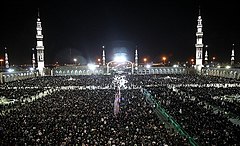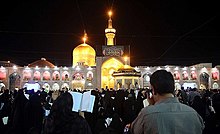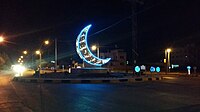| Night of Destiny | |
|---|---|
 Reading the Quran is a key observance of Laylat al-Qadr Reading the Quran is a key observance of Laylat al-Qadr | |
| Official name | ليلة القدر |
| Also called | Night of Destiny, Precious Night, Night Of Decree or Night of Determination |
| Observed by | Muslims |
| Type | Angels descend to the earth and the annual decree is revealed to them |
| Observances | Tahajjud night prayers, reading the Quran, making dua, doing dhikr, observing iʿtikāf, giving sadaqah |
| Date | Often observed as 21st, 23rd, 25th, 27th or 29th Ramadan and some add 19th to series. |
| Frequency | Annual |
| Part of a series on |
| Islamic culture |
|---|
| Architecture |
| Art |
| Clothing |
| Holidays |
| Literature |
| Music |
| Theatre |
The Night of Power (Arabic: لیلة القدر, romanized: Laylat al-Qadr; also rendered as the Night of Destiny, Night of Decree, Night of Determination, or the Precious Night), is, in Islamic belief, the night when Muslims believe the Quran was first sent down from heaven to the world, and also the night when its first verses were revealed to the Islamic prophet Muhammad; it is described as better than a thousand months of worshipping. According to various hadiths, its exact date is uncertain but was one of the odd-numbered nights of the last ten days of Ramadan, the ninth month of the Islamic calendar. Since that time, Muslims have regarded the last ten nights of Ramadan as being especially blessed. Muslims believe the Night comes again every year, with blessings and mercy of God in abundance. The surah al-Qadr is named after this night, and the purpose of the surah is to describe the greatness of the night.
Naming
Qadr (قدر), in Arabic, means measure and limit or value of something or destiny. Some reasons have been offered for its naming:
- It is said that it was called al-Qadr because the annual destiny of every person will be determined by God.
- Some say that if one stays awake at this night praying, reading Quran, or repenting, one will reach a high state.
- Some have said that it was called al-Qadr because it is a grand and high-value night.
Other names such as "Laylat al-'Azama" (Arabic: ليلة العظمة; night of the greatness) and "Laylat al-Sharaf" (Arabic: ليلة الشرف; lit. 'night of the honor') have also been used.
Revelation to Muhammad
Some commentators believe that the Quran was revealed to Muhammad twice;
- the 'immediate revelation' happening on the Laylat al-Qadr and
- 'gradual revelation' over 23 years.
The Quran uses the word anzal (انزل) which justifies 'the immediate revelation', according to Allamah Tabatabai. Some others believe that the revelation of Quran occurred in two phases, with the first phase being the revelation in its entirety on Laylat al-Qadr to the angel Gabriel (Jibril in Arabic) in the lowest heaven, and then the subsequent verse-by-verse revelation to Muhammad by Gabriel. The revelation started in 610 CE at the Hira cave on Mount Jabal al-Nour in Mecca. The first Surah that was revealed was Sūrat al-ʿAlaq (in Arabic العلق). During Muhammad's first revelation, the first five verses of this Surah, or chapter, were revealed.
Muhammad would usually practice spiritual retreat (Iʿtikāf) during the last ten days of Ramadan, awaiting the Night of Power, fasting and praying throughout the night, and abstaining from sexual relations. He urged his followers to do the same. According to one hadith, Muhammad said: "Whoever stands during the Night of Power out of belief and seeking reward, his previous sins are forgiven." (Sahih al-Bukhari 1901)
Date
A specific date of Laylat al-Qadr is not mentioned in the Quran. Muhammad said God told him the exact date of Laylat al-Qadr in a dream, that he went to tell his companions about that date, and that he saw two people fighting and was caused to forget the date (by God).
According to the Islamic calendar, an Islamic day begins at Maghrib prayer (sunset). The Night of Power extends from Maghrib to Fajr prayer (dawn).
Sunni Islam
Sunni Muslims believe that Laylat al-Qadr most likely occurs among the odd-numbered nights of the last ten nights of Ramadan (21st, 23rd, 25th, 27th or 29th). Some scholars opine that if a Friday night occurs on an odd numbered night, the night is likely to be Laylat al-Qadr.
| Last five odd nights | Gregorian date |
|---|---|
| 1441 | 25 May 2019, 27 May 2019, 29 May 2019, 31 May 2019, 2 June 2019 or 4 June 2019 |
| 1442 | 15 May 2020, 17 May 2020, 19 May 2020, 21 May 2020 or 23 May 2020 |
| 1443 | 4 May 2021, 6 May 2021, 8 May 2021, 10 May 2021 or 12 May 2021 |
| 1444 | 22 April 2022, 24 April 2022, 26 April 2022, 28 April 2022, or 30 April 2022 |
| 1445 | 31 March 2024 ,2 April 2024,4 April 2024, 6 April 2024, or 8 April 2024 |
Shia Islam
See also: Assassination of Ali

Shia Muslims similarly believe that Laylat al-Qadr is to be found in the last ten odd-numbered nights of Ramadan but mostly on the 19th, 21st or 23rd of Ramadan with 23rd being the most important night. The 19th, according to the Shia belief, coincides with the night Ali was attacked in the Mihrab while worshipping in the Great Mosque of Kufa. He died on 21 Ramadan.
Shia Muslims say that Ali (the first Shia Imam, and the fourth caliph of the Rashidun Caliphate to Sunnis) had special insight and intimacy with God on this night. Imam Sadiq is quoted as saying (Tafsir "al-Burhan", vol. 4, p. 487):
Once Imam Ali was reciting Surat al-Qadr and his sons, Imam Hasan (a) and Imam Husayn (a) were near him. Imam Husayn (a) asked his father: "Father, how come we feel a different sensation when you recite this surah?" Imam Ali(a) replied, "O son of the Prophet and my son! I know things from this chapter that you are not aware of now. When this surah was sent down to the Prophet he asked me to go to him. When I went to him he recited this surah, then he put his hand on my right shoulder and said: O my brother and my successor! O the leader of my nation after me! O tireless fighter with my enemies! This surah is yours after me, and is for your two sons after you. Gabriel who is my brother among the angels informs me of the events of one year of my nation at the night of Qadr. And after me he will give this information to you. This surah will always have a shining light in your heart and in the heart of your successors until the rising of the dawn of the day of reappearance of Qa'im ."
Ibn Abbas was aware of both the date and the day of the week. Hence the Shia's have generally concluded that it is the 23rd
According to other hadiths, destinies are written on the night of Ramadan 19, are finalized on the night of Ramadan 21, and are ultimately confirmed on the night of Ramadan 23.
Two other possibilities about the time of the Night of Qadr are the nights of Ramadan 27 and Sha'ban 15.
| 23rd of Ramadan | Gregorian date |
|---|---|
| 1440 | 28 May 2019 |
| 1441 | 16 May 2020 |
| 1442 | 5 May 2021 |
| 1443 | 24 April 2022 |
| 1444 | 23 April 2023 |
Religious importance
The night is not comparable to any others in view of Muslims and according to a tradition, the blessings due to the acts of worship during this night cannot be equaled even by worshipping throughout an entire lifetime. The reward of acts of worship done in this one single night is more than the reward of a thousand months of worship.
Surah Al-Qadr of the Quran is about Laylat al-Qadr:
- We have indeed revealed this (Message) in the Night of Decree:
- And what will explain to thee what the Night of Decree is?
- The Night of Decree is better than a thousand months.
- Therein come down the angels and the Spirit by Allah's permission, on every errand:
- Peace!... This until the rise of dawn!
— Surah Al-Qadr 97:1-5
Devout Muslims practice spiritual retreat (Iʿtikāf) during the last ten days of Ramadan, awaiting the Night of Power, fasting and praying throughout the night, and abstaining from sexual relations. Some Muslims practice Iʿtikāf by staying at a mosque throughout the ten days.
Special prayers (Shi'a)
Shi'as practice the special prayers (Amaal) of the Night of Qadr every year in mosques, s, shrines of Imams or children of Imams, Husayniyyas or their own houses. They stay vigilant the whole night until dawn and worship God. The most important practices of the Night of Qadr include congregational prayers, recitation of the Iftitah Supplication, Supplication, and al-Jawshan al-Kabir, and collective supplications while they keep volumes of the Quran on top of their heads. Other rituals of the night include donations of dawn food, payment of their nadhr for the dead, feeding the poor, and emancipation of financial prisoners.
Since the assassination of Ali occurred in the last ten days of the Ramadan month, Shi'as mourn in these nights.
See also
- Predestination in Islam (Qadar)
- Ehya night
- Glossary of Islam
- Islamic calendar
- Islamic holidays
- Dehwa d-Šišlam Rabba, The Night of Power takes place during this festival in Mandaeism
References
- Britannica Guide to the Islamic World. Encyclopaedia Britannica, Inc. 2009. ISBN 9781593398491. Archived from the original on 8 April 2022. Retrieved 2 June 2017.
- Daneshgar, Majid; Saleh, Walid A (eds) (2017). Islamic Studies Today: Essays in Honor of Andrew Rippin. Leiden. p. 93. ISBN 9789004337121. Archived from the original on 4 March 2020. Retrieved 31 May 2017.
{{cite book}}:|first2=has generic name (help)CS1 maint: location missing publisher (link) - ^ A. Beverley, James (2011). "Laylat al-Qadr". In Melton, J. Gordon (ed.). Religious Celebrations: An Encyclopedia of Holidays, Festivals, Solemn Observances, and Spiritual Commemorations : An Encyclopedia of Holidays, Festivals, Solemn Observances, and Spiritual Commemorations. Volume two L-Z. Santa Barbara, CA: ABC-CLIO. p. 517. ISBN 9781598842067. Archived from the original on 4 November 2020. Retrieved 31 May 2017.
- Halim, Fachrizal A. (2014). Legal Authority in Premodern Islam: Yahya B Sharaf Al-Nawawi in the Shafi'i School of Law. Routledge. p. 15. ISBN 9781317749189. Archived from the original on 4 November 2020. Retrieved 31 May 2017.
- Sahih al-Bukhari. "Book of Revelation - Sayings and Teachings of Prophet Muhammad (صلى الله عليه و سلم)". As-Sunnah Foundation of America. Archived from the original on 24 May 2020. Retrieved 21 March 2020.
- Seyyed Hossein Nasr (2015), The Study Quran, HarperCollins, p.1539
- 97:1-5
- Qarashī, Qāmūs al-Qurʾān, vol. 5, p. 246–247.
- Tabatabai, Tafsir Al-Mizan, 1363, vol. 20, p. 561.
- Ghadmiari, "Night of Destiny in Hafez's lyric poems", p. 180.
- Makarem Shirazi, Tafsir Nomoneh, 1996, vol. 27, p. 188.
- Majidi Khameneh. Nights of Glory in Iran. p. 1.
- Staff. "Qadr night from the view point of Allamah Tabtabaei". Allamah Tabtabaei University. Archived from the original on 3 July 2016. Retrieved 12 June 2016.
- al-Mubarakpuri, Safi-ur-Rahman (2002). The Sealed Nectar. Riyadh: Dar-us-Salam. p. 68. ISBN 978-1591440710.
- Roslan Abdul-Rahim (December 2017). "Demythologizing the Qur'an Rethinking Revelation Through Naskh al-Qur'an" (PDF). Global Journal Al-Thaqafah. 7 (2): 62–3. doi:10.7187/GJAT122017-2. ISSN 2232-0474. Archived (PDF) from the original on 14 February 2019. Retrieved 26 February 2019.
- https://sunnah.com/bukhari:1901
- Seyyed Hossein Nasr (2015), The Study Quran, HarperCollins, p.1539
- Islam and state in Sumatra: a study of seventeenth-century Aceh. p. 128.
- Marjo Buitelaar. Fasting and feasting in Morocco: women's participation in ramzan. p. 64.
- Sahih Bukhari. "Chapter: 2, Belief. Hadith No. 47". Archived from the original on 2 June 2020. Retrieved 10 May 2020.
- "The Night of Power - Laylatul Qadr 2023". Islamic Relief UK. Retrieved 6 October 2023.
- Mohammad Younes, Arefi. "The importance of Qadr night and the secret behind it's being hidden". The Message of Woman (in Persian). Archived from the original on 13 August 2016. Retrieved 12 June 2016.
- Parsa, Farvardin. "Laylat al-Qadr from the viewpoint of Sunni Muslims". Andisheh Club. Archived from the original on 21 August 2016. Retrieved 12 June 2016.
- "The Umm al-Qura Calendar of Saudi Arabia". Archived from the original on 11 June 2011. Retrieved 18 November 2020.
- ^ Ysuf, Imtiyaz. "Laylat al-Qadr". The Oxford Encyclopedia of the Islamic World. Archived from the original on 18 April 2018. Retrieved 2 June 2017.
- Syed Muhammad Askari Jafari. "A biographical profile of Imam Ali". Archived from the original on 9 September 2018. Retrieved 10 May 2020.
- "Imam Mahdi (a) in Chapter al-Qadr". Al-Islam.org. 10 August 2016. Archived from the original on 6 April 2019. Retrieved 21 March 2020.
- Sahih Bukhari. "Chapter: 32, Night prayer in Ramadan (Taraweeh). Hadith No: 239". Archived from the original on 3 June 2020. Retrieved 10 May 2020.
Ibn Abbas added "Search for it on the twenty-fourth (of Ramadan)"
- Bombay Tract and Book Society (1856). Life of Mohammad. Bombay. p. 30. Archived from the original on 4 November 2020. Retrieved 12 September 2020.
{{cite book}}: CS1 maint: location missing publisher (link) In Islam night precedes day, so that, for example, "the night of the 23rd" is not the night between the 23rd and the 24th but the night between the 22nd and the 23rd. - Klini, Sufficient Principles, 1996, vol. 2, p. 772.
- Kashani, Manhaj Al-Sadiqin, 1344, vol. 4, p. 274, quoting Eftekhari, \"Prayer and the Night of Power from the perspective of Musa Sadr\", p17.
- "Ramadan Calendar 2024". Islamicfinder. Archived from the original on 23 April 2019. Retrieved 23 April 2019.
- "Calendar center of Geophysics institute of Tehran University, 1398 Calendar" (in Persian)" (PDF). calendar.ut.ac. Archived (PDF) from the original on 12 May 2019. Retrieved 12 May 2019.
- "Calendar center of Geophysics institute of Tehran University, 1399 Calendar" (in Persian)" (PDF). calendar.ut.ac. Archived (PDF) from the original on 25 May 2020. Retrieved 5 April 2020.
- "Calendar center of Geophysics institute of Tehran University, 1400 Calendar" (in Persian)" (PDF). calendar.ut.ac. Archived from the original (PDF) on 27 January 2022. Retrieved 3 April 2022.
- "Calendar center of Geophysics institute of Tehran University, 1401 Calendar" (in Persian)" (PDF). calendar.ut.ac. Archived from the original (PDF) on 24 April 2022. Retrieved 3 April 2022.
- "Calendar center of Geophysics institute of Tehran University, 1403 Calendar" (in Persian)" (PDF). Archived from the original (PDF) on 31 March 2024.
- Halim, Fachrizal A. (20 November 2014). Legal Authority in Premodern Islam: Yahya B Sharaf Al-Nawawi in the Shafi'i School of Law. Routledge. p. 15. ISBN 9781317749189. Archived from the original on 24 February 2020. Retrieved 31 May 2017.
- Habib Rauf (2016), Itikaf: An Introduction. Glasgow Central Mosque.
- Majidi Khamenei, "Nights of Glory in Iran".
External links
| Islamic holidays and observances | |
|---|---|
| The two Eids | |
| Other holidays and observances | |
| January |
|
|---|---|
| February |
|
| March |
|
| April |
|
| May |
|
| June–July–August |
|
| June |
|
| July |
|
| September | |
| October | |
| November |
|
| December |
|
| Varies (year round) |
|
| Bold indicates major holidays commonly celebrated in Algeria, which often represent the major celebrations of the month. See also: Lists of holidays. | |
| Ramadan | ||
|---|---|---|
| Background |  | |
| Meals | ||
| Prayers and observances | ||
| Ramadan culture | ||
| People and things in the Quran | |||||||||||||||||||||||||||||||||||||||||||||||||||||||||||||||||||||||||||||
|---|---|---|---|---|---|---|---|---|---|---|---|---|---|---|---|---|---|---|---|---|---|---|---|---|---|---|---|---|---|---|---|---|---|---|---|---|---|---|---|---|---|---|---|---|---|---|---|---|---|---|---|---|---|---|---|---|---|---|---|---|---|---|---|---|---|---|---|---|---|---|---|---|---|---|---|---|---|
| |||||||||||||||||||||||||||||||||||||||||||||||||||||||||||||||||||||||||||||
| |||||||||||||||||||||||||||||||||||||||||||||||||||||||||||||||||||||||||||||
| |||||||||||||||||||||||||||||||||||||||||||||||||||||||||||||||||||||||||||||
| |||||||||||||||||||||||||||||||||||||||||||||||||||||||||||||||||||||||||||||
| Note: Names are sorted alphabetically. Standard form: Islamic name / Biblical name (title or relationship) | |||||||||||||||||||||||||||||||||||||||||||||||||||||||||||||||||||||||||||||